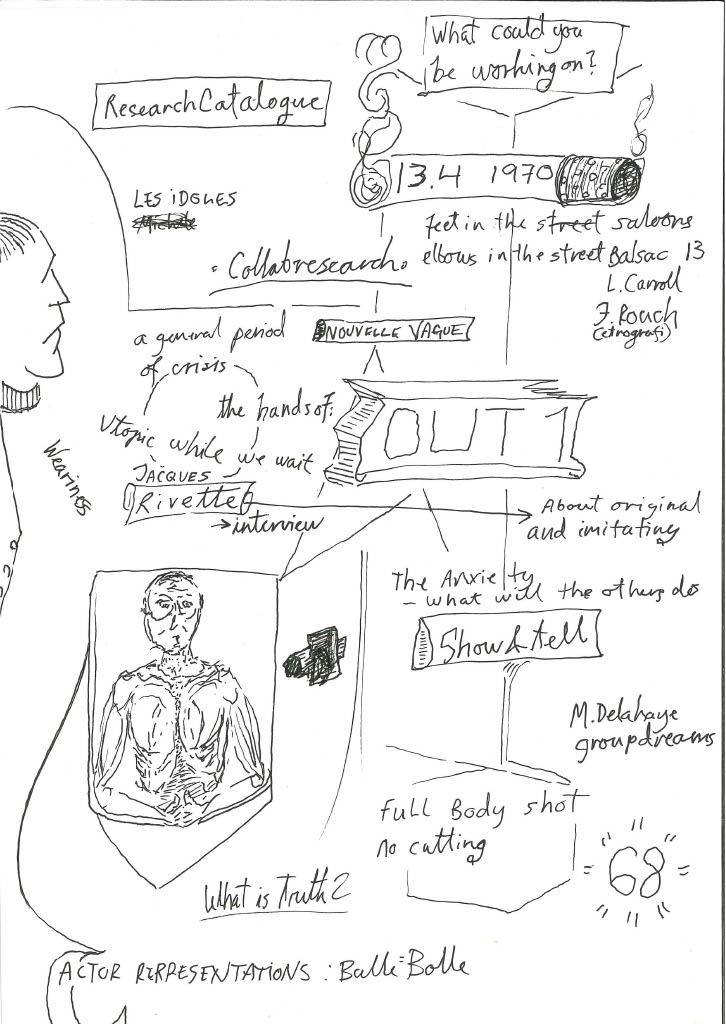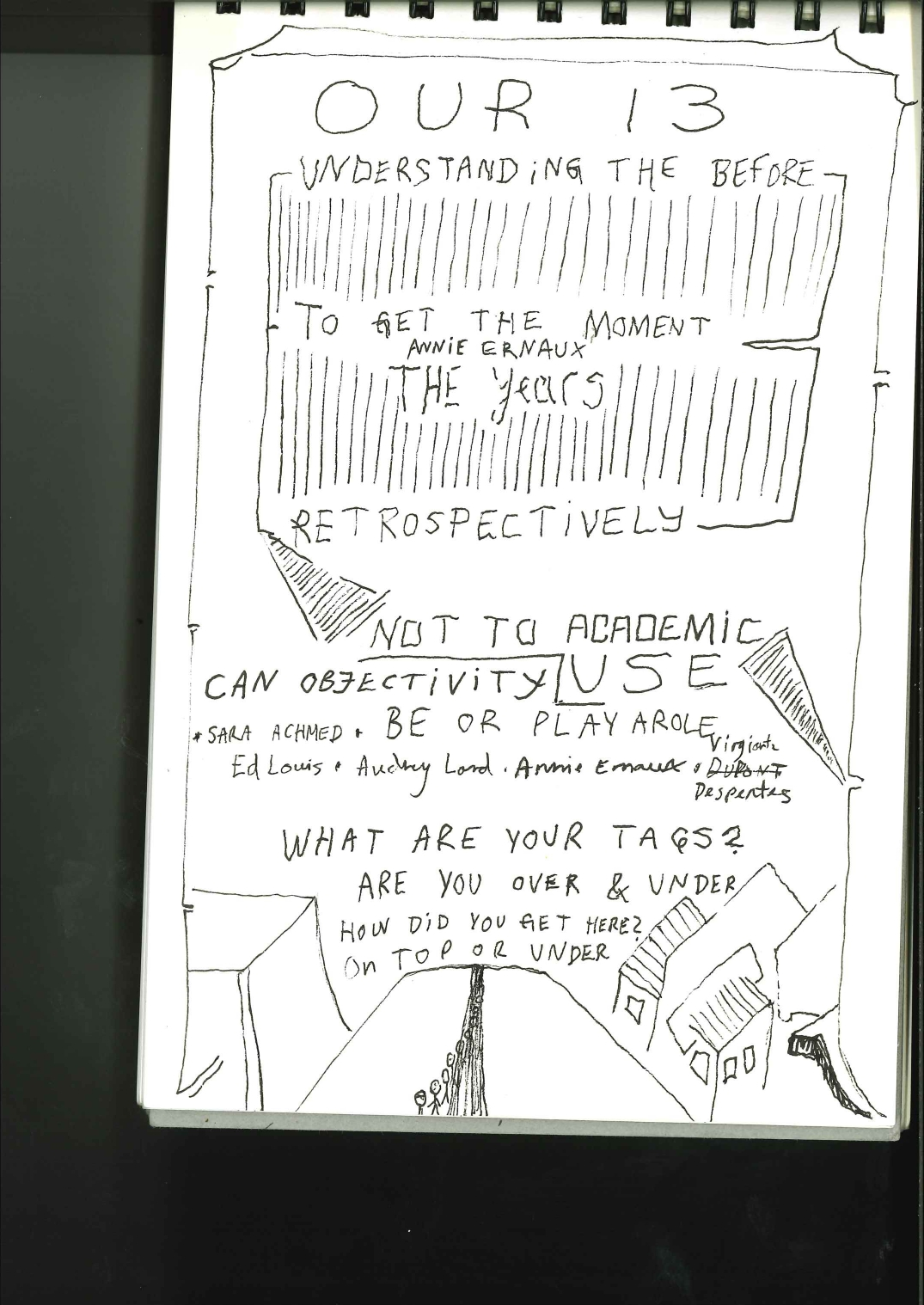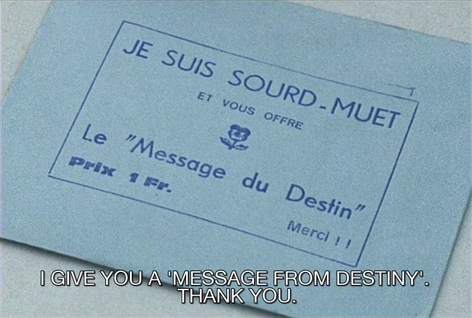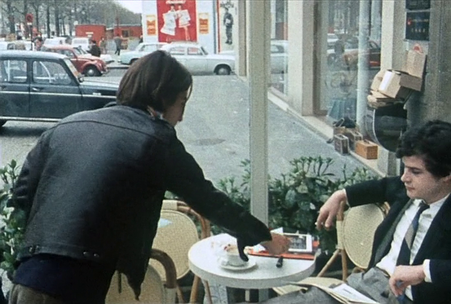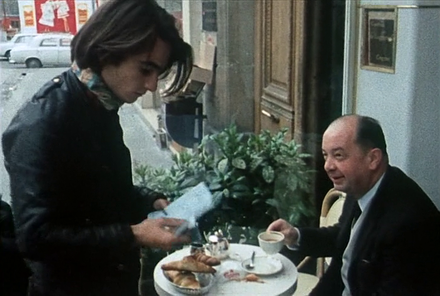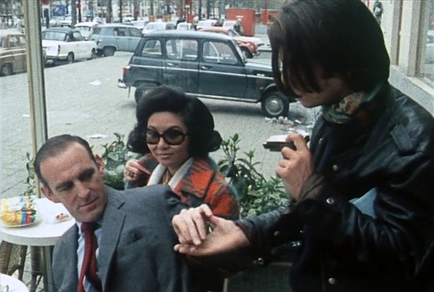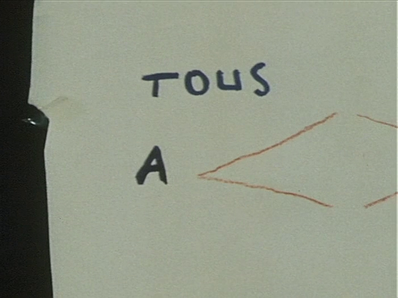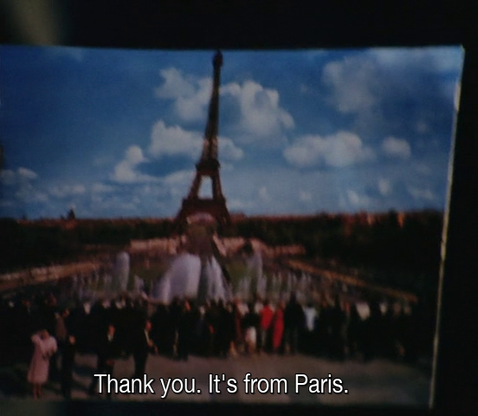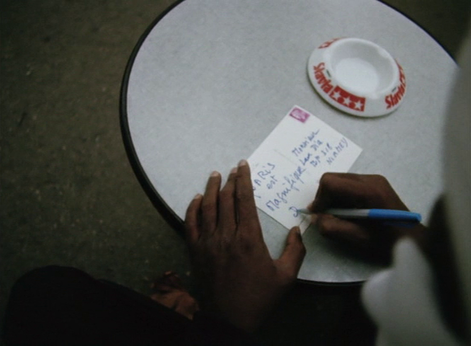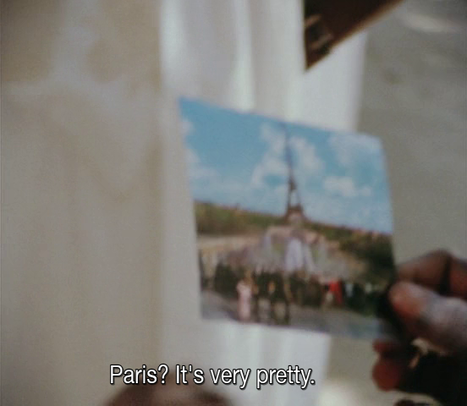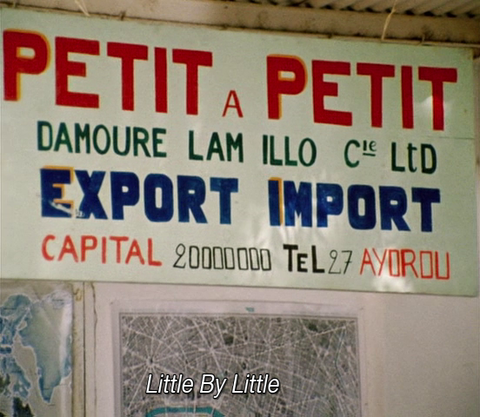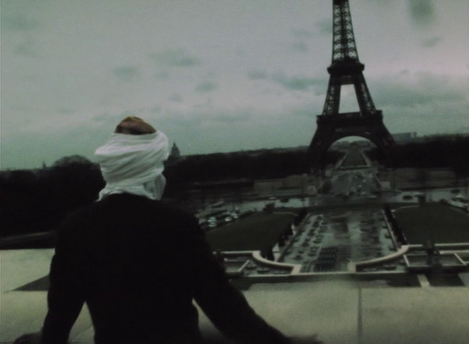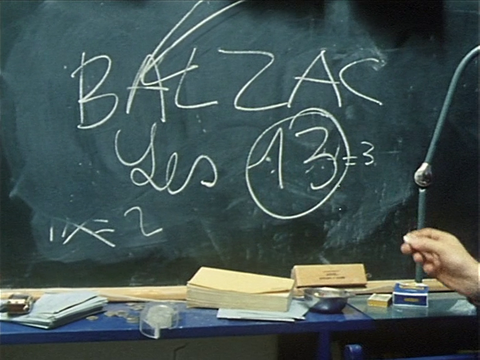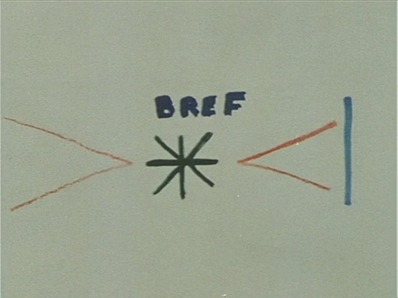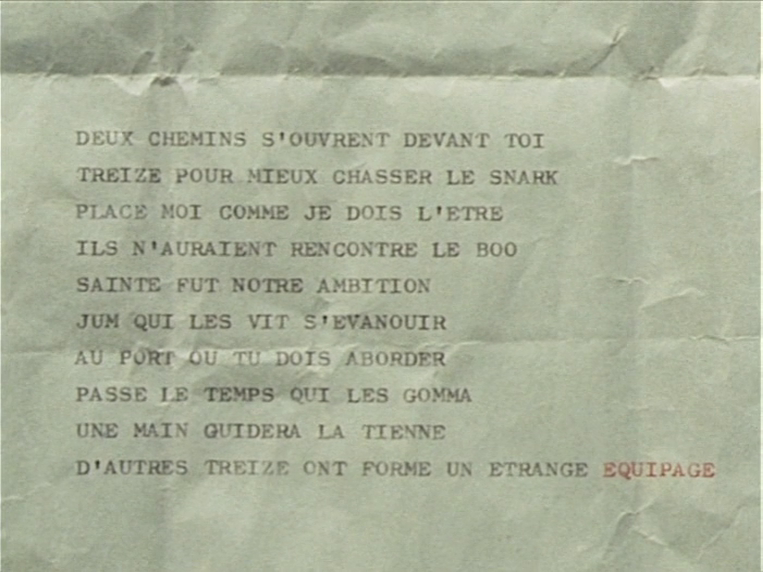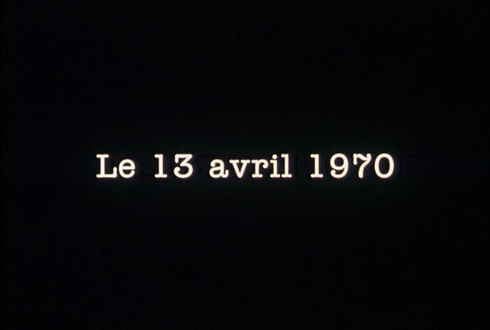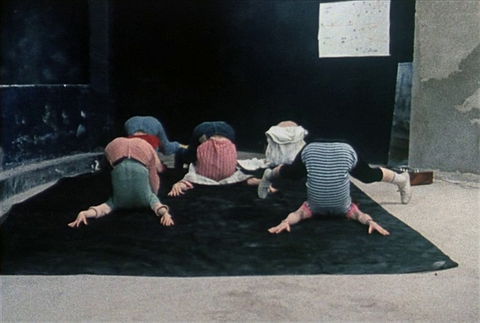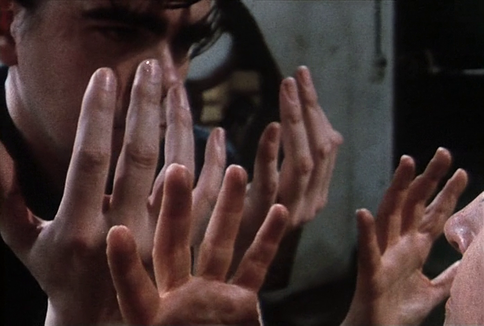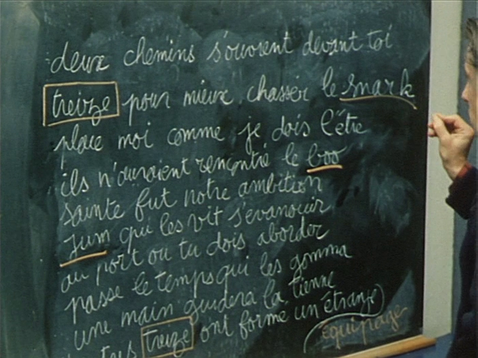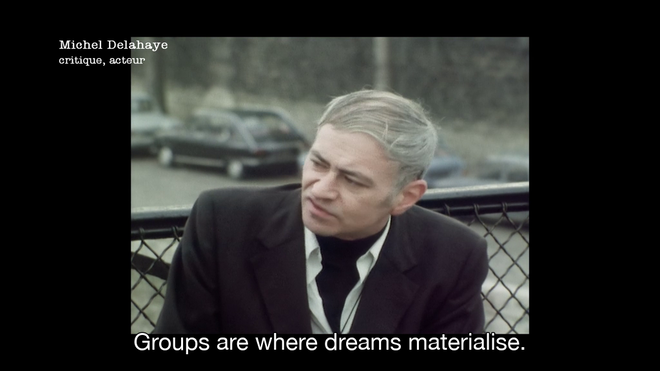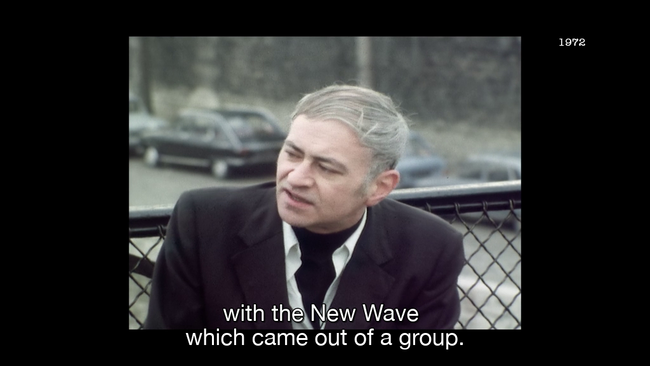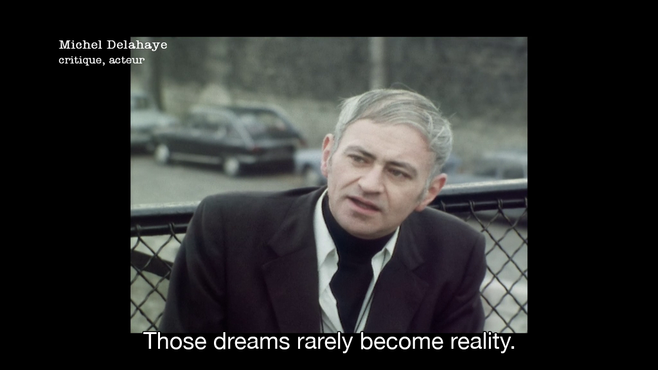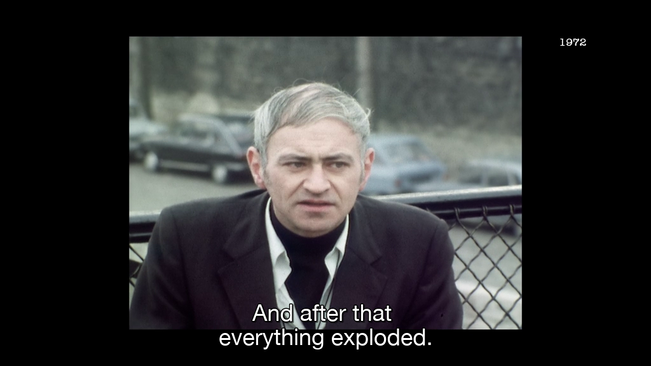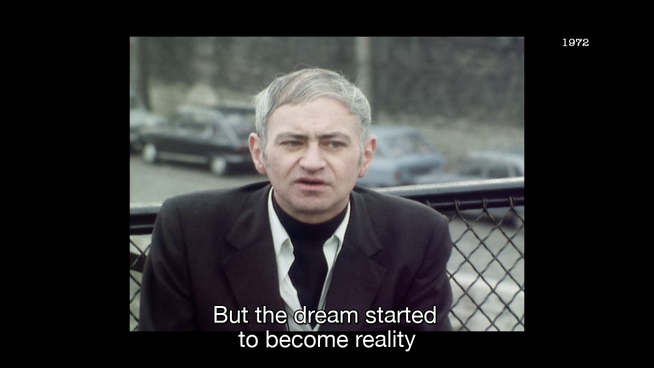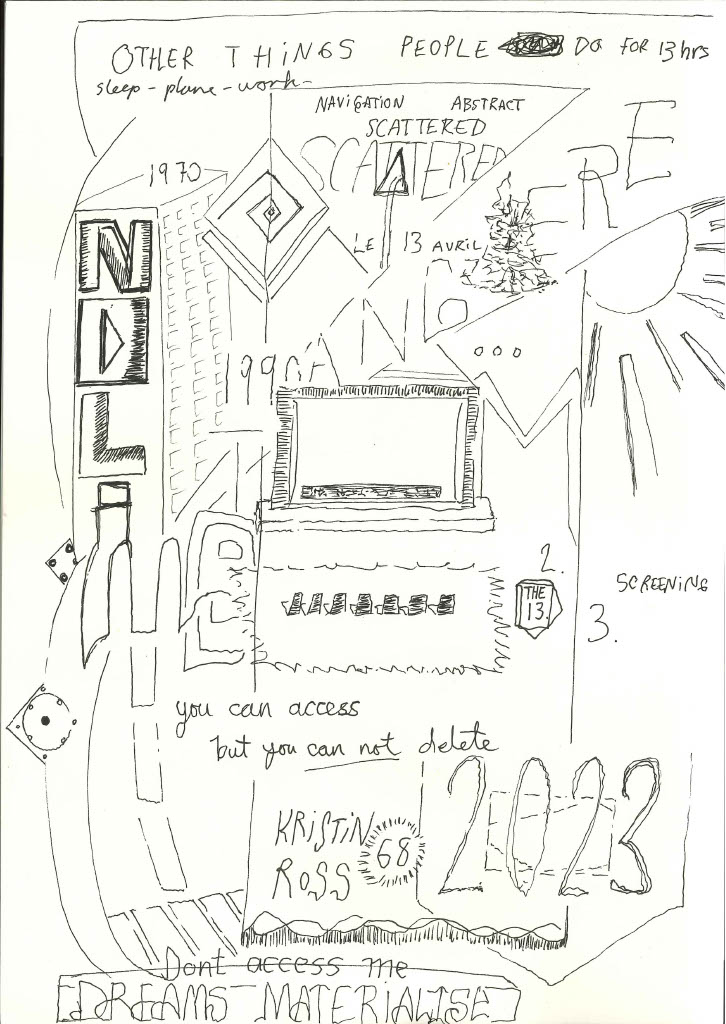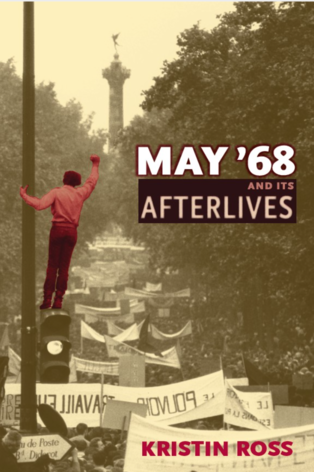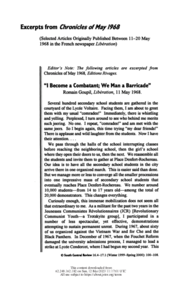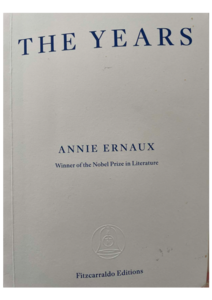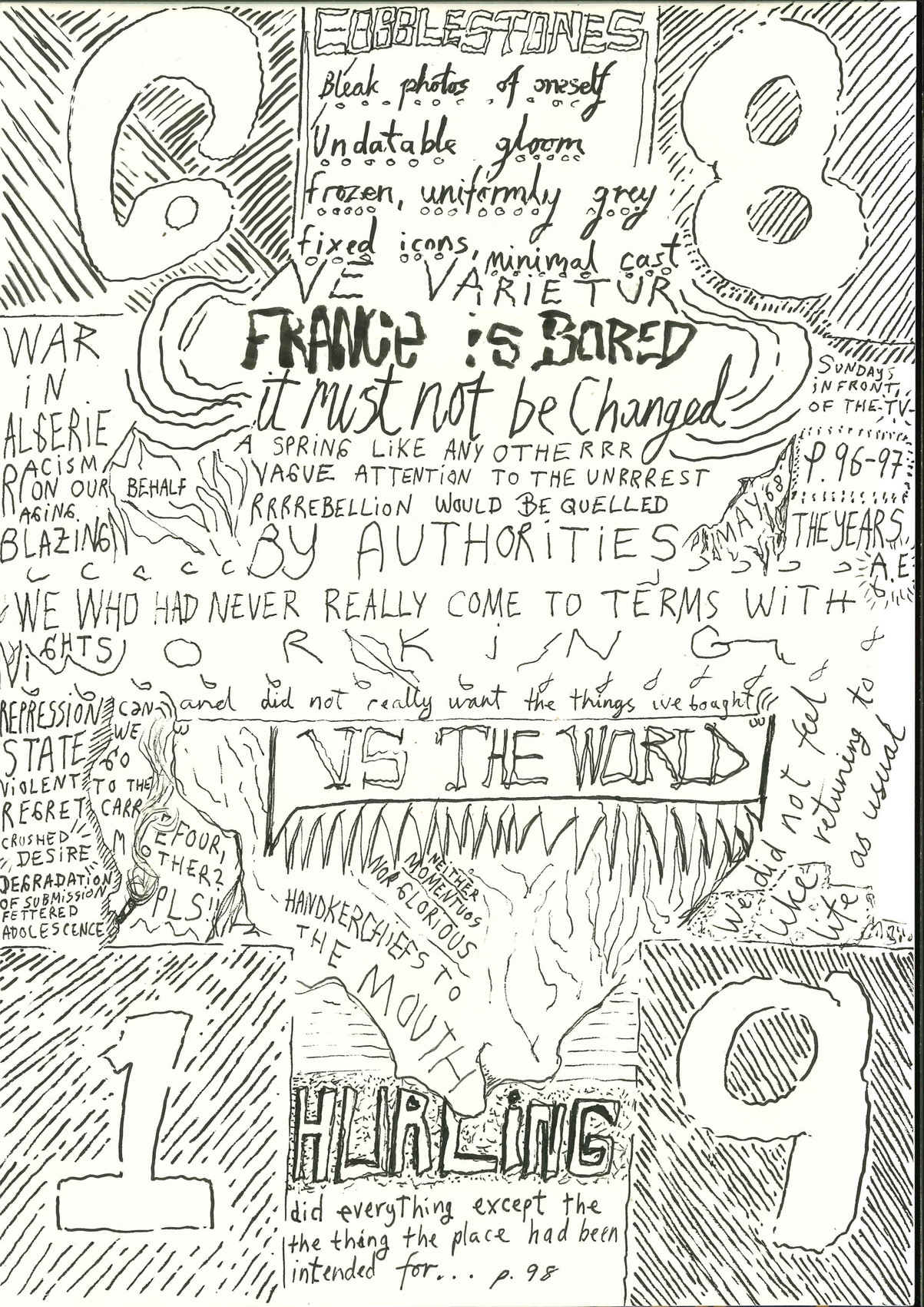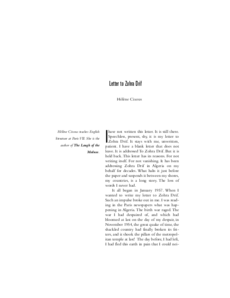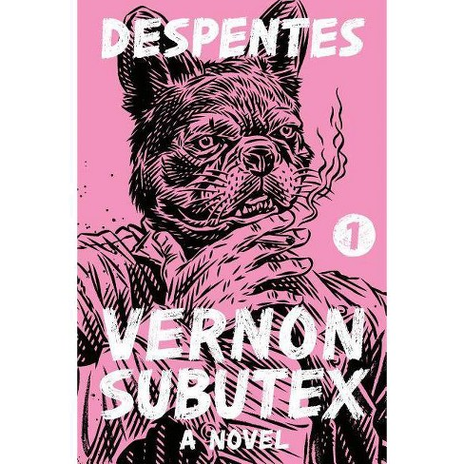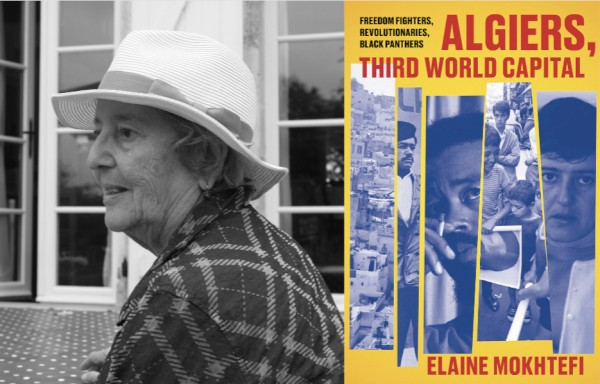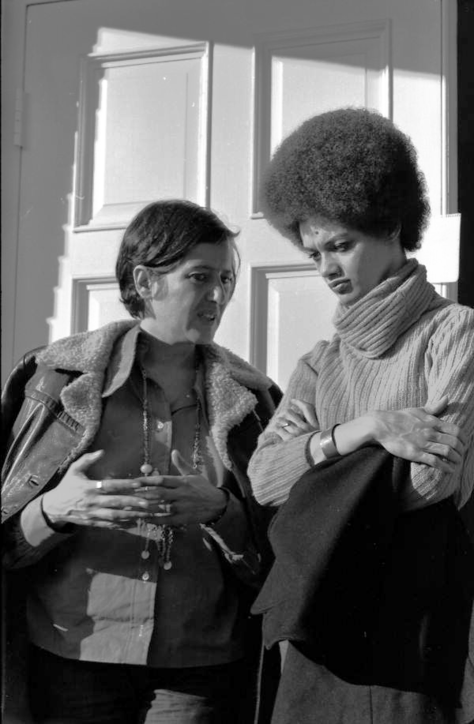OUT 1: Noli Me Tangere (1970)
an expirement by Jacques Rivette, together with Suzanne Schiffman, the actors and crew
filmmaking as methodology
Two paths lie open before you. Thirteen to hunt the Snark better. Place me as I should be. They won't have met the Boo. Holy was our ambition. Juni who saw them faint. At the harbour where you must start. Spend the time that will erase them. A hand will guide your own. Otherthirteens have formed a strange crew.
TITLE AND TIMING
THE TIME IT TAKES TO WATCH A FILM
JACQUES RIVETTE: The main impulse behind Out 1 was provided by a screening of the similar kind of montage Jean Rouch had made for his film Petit a Petit. It ran for eight hours and was totally different from the four-hour version Rouch made, theoretically for television, and the ninety-minute version shown in cinemas. I was so impressed by the original that I refused to see the shorter versions. Out of that -- with disastrous consequences, as you know -- came the thirteen-hour version of Out 1. We still don't know whether there will ever be enough money to make a print, although the negative must be in pretty good shape because it wasn't tampered with too much.
.... there were found Thirteen women equally impressed with the same idea, equally endowed with energy enough to keep them true to it, while among themselves they were loyal enough to keep faith even when their interests seemed to clash...
Otherthirteens have formed a strange crew.
Jacques Rivette (1974)
Interviewed by Carlos Clarens, Edgardo Cozarinsky
With your three most recent films -- L'Amour fou, Out 1: and Celine et Julie vont en bateau -- one feels that you are becoming progressively more and more interested in the actors.
JACQUES RIVETTE: When I began making films my point of view was that of a cinephile, so my ideas about what I wanted to do were abstract. Then, after the experience of my first two films, I realized I had taken the wrong direction as regards methods of shooting. The cinema ofmise en scene, where everything is carefully preplanned and where you try to ensure that what is seen on the screen corresponds as closely as possible to your original plan, was not a method in which I felt at ease or worked well. What bothered me from the outset, after I had finally managed to finish Paris Nous Appartient with all its tribulations, was what the characters said, the words they used. I had written the dialogue beforehand with my co-writer Jean Gruault (though I was ninety per cent responsible) and then it was reworked and pruned during shooting, as the film otherwise would have run four-and-a-half hours. The actors sometimes changed a word here and there, as always happens in films, but basically the dialogue was what I had written -- and I found it a source of intense embarrassment. So much so that when I began work on La Religieuse, which was a project that took quite a while to get off the ground, I determined this time to use what was basically a pre-existing text.
But in a group of actors, when you put on a play, the group comes together for material, technical and profeessional reasons, precise reasons. That might be the reason why Rivette returned in L'Amour Fou and Out 1 to a group of theater actors.
Michel Delahaye, 1972
Annie Ernaux, The Years -- quoted form Bookforum, Devouring the Present (2018)
"Individuals, whether or not they were intellectuals, were entitled to speak and be heard. They needed only represent a group, a condition, an injustice. The fact of having experienced something as a woman, homosexual, class defector, prisoner, farmer, or miner gave one permission to speak in the first person. To think of oneself in collective terms brought a certain exaltation."
Kristin Ross:
The principal idea of May was the union of intellectual contestation with workers’ struggle. Another way of saying this is that the political subjectivity that emerged in May was a relational one, built around a polemics of equality: a day-to-day experience of identifications, aspirations, encounters and missed encounters, meetings, deceptions, and disappointments. The experience of equality, as it was lived by many in the course of the movement—neither as a goal nor a future agenda but as something occurring in the present and verified as such—constitutes an enormous challenge for subsequent representation. The invention during the movement of forms of activity that put an end to representation and delegation, that undermined the division between directors and subordinates, practices that expressed a massive investment in politics as the concern of each and every individual and not just the concern of spe- cialists—such an experience threatens everything that is inscribed in our repertories for describing everyday life, all of the various ways we have to represent the social, all of the finite number of representations to which we can appeal. The problem was all the more acute twenty years later amid the ideological climate of the 1980s, when a generalized offensive against equality was launched under the cover of a critique of egalitarianism. This critique made equality a synonym for uniformity, for the constraint or alienation of liberty, or for an assault on the free functioning of the mar- ket. When the union of intellectual contestation with workers struggle, when that idea slips away or is forgotten, what remains of ’68 cannot be much more than the prefiguration of an “emancipatory” counterculture, a metaphysics of desire and liberation, the rehearsal for a world made up of “desiring machines” and “autonomous individuals” rooted to the irreducible ground of personal experience.
Another Gaze is a feminist film journal, founded in January 2016.
Another Screen is a new, free streaming project by Another Gaze journal, created to foreground rare film work we deem worthy of feminist interrogation, across geographies and modes of production, featuring guest programmers and collaborators. Each programme will be available for one week and contextualised by new writing and translations.
Notebook Primer: Feminist Film Collectives
Text: Rachel Pronger
Always, throughout the history of cinema, women have made films. And always, they’ve worked within the limits of a patriarchal industry. As a result, the films that women have made have historically been compromised by this imbalance of power. But what if there was another way? What if this inherently collaborative artform could become a space of solidarity, subversion and sisterhood?
In Be Pretty and Shut Up! (1976) Seyrig interviews twenty-four actresses, including Jane Fonda, Ellen Burstyn, and Maria Schneider, asking candid questions about their experiences of sexism at work.
Kristin Ross:
My own research into the political language of the May movement has extended beyond the initial, invaluable compilation of documents assembled by Alain Schnapp and Pierre Vidal-Naquet in 1969. I have found the filmed documentary footage, small publications, and mimeographed pamphlets from all kinds of groups, the often ephemeral journals, and the interpretations written in the white heat of the moment to be of much more interest and value than any of the interpretive commentaries—by Edgar Morin, Claude Lefort, Michel de Certeau, among others—consecrated in the years afterward. Yet one need only refer to the pamphlets and tracts included in Schnapp and Vidal-Naquet’s survey to establish the clear ideological targets of the May movement in France. These were three: capitalism, American imperialism, and Gaullism. How then do we arrive, twenty years later, at a consensus view of ’68 as a mellow, sympathetic, poetic “youth revolt” and lifestyle reform? The answer lies in the dominant narrative configurations—mostly reductions or circumscriptions of the event—adopted by the official story. The first of these configurations, a temporal reduction, has produced an abbreviated chronology whereby what we understand by “May” has become, quite literally, what transpired during the month of May 1968. More specifically, “May” begins on May 3, when the forces of order are called into the Sorbonne, initiating student arrests that in turn provoke violent popular demonstrations during the weeks that follow in the streets of the Latin Quarter. “May” ends on May 30, when de Gaulle makes a speech in which he announces he will not step down from the presidency, threatens army intervention, and dissolves the National Assembly. May, then, is May—and not even June, when close to 9 million people, in every region of the country and across all of the different employment sectors were out on strike. The largest general strike in French history recedes into the background, along with the prehistory of the uprising, which goes back at least to the ending of the Algerian War in the early 1960s. The violent state repression that helped bring an end to the May-June events is not invoked, nor is the gauchiste violence that continued well into the early 1970s. In fact, a whole fifteen- to twenty-year period of radical political culture is occulted from view, a political culture whose traces were manifest in the growth of a small but significant opposition to the Algerian War and in the embrace by many French of a “third-worldist” north/south analysis of global politics in the wake of the enormous successes of the colonial revolutions. This political culture was also manifest in the recurrent outbreaks of worker unrest in French factories throughout the mid-1960s, in the rise of an anti-Stalinist, critical Marxist perspective available in countless journals that flourished between the mid-1950s and the mid-1970s.
S.C.U.M. Manifesto stages a reading of Valerie Solanas’s eponymous manifesto from 1967. As news images of male-dominated world events flicker across the television screen, Delphine Seyrig disseminates Valerie Solanas’s theses on men – who, according to the manifesto, are both biologically incomplete and driven by vagina envy.
But, as she intimates early on, the wave was bound to crash: “At holiday lunches, references to the past were few and far between. For the younger people there seemed no point in exhuming the grand narrative of our entry into the world.” For the revolution had waned, Jean-Marie Le Pen and the National Front were commanding the attention of journalists and voters, and “the ideals of May ’68 were being transformed into objects and entertainment.”
Yannis Hamilakis: You worked closely with Vidal-Naquet.
Alain Schnapp: Yes. In 1968 the Sorbonne was occupied, and one of the problems was that the Sorbonne is itself a very big monument. Thus the risks of looting, of major damage and injury, were great. So the group of students and professors who had occupied the Sorbonne at this time created a kind of internal structure to protect the Sorbonne. And Vidal-Naquet, Daniel Roche, Jacques Julliard and Emmanuel Leroy Ladurie – all these people who had such an extraordinary influence on the development of French history – were there. At the end of the process, towards the end of May, beginning of June, when the Sorbonne was evacuated, Jacques Julliard (who was the editor of the French Catholic press Le Seuil, a press which was very involved in the battle against the Algerian War also) asked us to publish a chronicle with the title Journal de la commune étudiante (Schnapp and Vidal-Naquet 1969). This was translated into English as the French student uprising by Maria Jolas, another inter- esting figure (Schnapp and Vidal-Naquet 1971).
YH: Was that report an account of the uprising?
AS: It was partially that, but more interestingly, it was a collection of more than 700, 800 leaflets produced by students, with a kind of epigraphic commentary. Vidal-Naquet, who was well trained in epigraphy, tried to create the intellectual framework of the work.
YH: So it was a contemporary archaeology of May 1968?
AS: We could say that but it was mostly an extraordinary collection of manifestos which were produced by the students of the Ecole des beaux arts. The book was published six months after the events – to collaborate with Vidal-Naquet, to collect and to comment on these events was an extraordinary opportunity.
YH: You were then a graduate student – talking about May 1968, what do you think was the major impact of that event on scholarship more generally, but also, specifically, in relation to Classics and classical archaeology?
AS: I think the period from the 1960s to the 1980s was the apex of humanistic scholarship; a new agenda for the humanities was established in France. I am not a nationalist, but when I retrospectively look at that moment, it’s incredible how many figures were teaching in Paris then: Georges Duby, Lévi-Strauss, Braudel. So in any field of the humanities one could meet most of the best people of their generation. This is not connected with 1968; it is connected with a kind of revenge of the French intellectuals after the war. You know, I mean the failure of the 1930s, when the Année sociologique, which was a journal that tried to create a new, general human science, was defeated by the political condition of pre-war France. All these people had some experience of resistance, imprisonment or exile: the exile of Lévi-Strauss in America; the deten- tion of Braudel in a prisoners’ camp. As you know, Braudel wrote most of his Méditerranée (Braudel 1972) in a prisoners’ camp during this time. These experiences of resistance, imprisonment and exile were instru- mental in shaping this generation. But 1968 was useful in the sense that this older generation established communication with the new one, now with a post-war agenda, after the terrible colonial Algerian War. Because if you look at our history, our experience of history in the 1950s and 1960s, the French had suffered the terrible effects of the German occupation, and the collaborationists and the Pétain regime and the fact that some of the resistance people who were involved in action against the Germans accepted using the same – more or less the same – attitude against the Vietnamese in the war in Vietnam, and against Algerians in the Algerian War.
BEHIND THE SCENES WITH VIRGINIE DESPENTES -- Lauren Oyler for Vice.
"Despentes deploys the archetype much as the men before her have done. Putting Vernon, the familiar sad sack, at the helm of her ship of queers, vagrants, immigrants, and spinsters, grants her a certain immunity—his problems will be read as societal ones rather than female ones. He does not represent any particular identity, just the world. His sexuality is not tainted by violence or trauma, but is open, eager, and benign." Emily Witt in The New Yorker: The Stinging Provocations of Virginie Despentes
“Vernon Subutex” is part slapstick caper and part social novel; by the end of the trilogy, it starts to verge into speculative fiction. There are rich characters and impoverished ones, Marxists and neo-Nazis, celibates and philanderers. They all circulate in a gentrified Paris that is not what it used to be, as the entire ensemble constantly laments. Her characters occasionally sound like another Gen Xer, Andrew Yang: “The economy no longer means anything to a whole section of the population,” one remarks. “They are no longer poor workers, they are unnecessary.” But these characters uniformly bemoan the gutting of France’s social safety net and the hypocrisy of leftist politicians who pander to the élite. They share the belief that complying with an economy of exploitation and greed is the true madness, and that maladjustment, even in the form of right-wing extremism or religious zealotry, is the only sane response. They process their emotions through music and movies—like Hornby, or Bret Easton Ellis, Despentes soundtracks her story with songs, and the novel is best read with speakers nearby.
Movements of flight with Hélène Cixous, Zohra Drif and Elaine Mokhtefi. Collage, assemblage, monatge.
Maria Jolas, an American-born translator who was one of the last survivors of James Joyce's Paris circle, died Wednesday at her home in Paris, where she had lived for almost 60 years. Mrs. Jolas, who was 94 years old, remained an American citizen.
With her husband, Eugene Jolas, she founded a Paris quarterly literary review called transition, which in the 1920's published articles by James Joyce, Gertrude Stein, Samuel Beckett, Dylan Thomas, Franz Kafka, William Carlos Williams, Henry Miller and James Agee.
The review published sections of Joyce's ''Work in Progress'' that eventually became ''Finnegans Wake,'' a book for which Mrs. Jolas corrected proofs. She and her family not only repeatedly helped the impoverished Joyce and his family, but after World War II she also rescued his papers and possessions from an attic in Montparnasse. Managed the Business
Unlike her husband, a critic and poet, Mrs. Jolas chose to manage the business side of the review. She also translated into English about a dozen books by Nathalie Sarraute, whose style -with broken sentences, stream of consciousness effects, characters who remain nameless for many pages and abrupt shifts in perspective - would prove daunting to any translator. Although her translations were widely praised, Mrs. Jolas insisted, in an interview in The New York Times Book Review in 1970, that translating is a lazy person's job. ''Someone else has done the thinking,'' she said, ''and you accompany him like a pianist accompanying the singer, self- effacing if essential.''
In the 1960's Mrs. Jolas was a leader of the Paris American Committee to Stop War, an organization of United States citizens who opposed American involvement in Vietnam. She also translated ''The French Student Uprising,'' a sympathetic account of events of 1967 and 1968. Born in Kentucky
Mrs. Jolas was born Maria McDonald in Louisville, Ky., in January 1893. After her graduation from high school she studied music in Berlin and Paris. Back in the United States she met Mr. Jolas, an American citizen who had been reared in France. They moved to Paris after their marriage in 1926, and remained there until the war. Before the war Mrs. Jolas founded a school in Neuilly, and when the Nazis invaded she evacuated some its students to a chateau in south central France. She and her husband returned to the United States during World War II and worked in the Office of War Information.
New York Times,
By Edwin McDowell March 7, 1987
Elaine Mokhtefi: My “enlightment” came on May Day, 1952. I’d been living in Paris for several months I discovered the “lie”. It happened as I stood on the rue du Faubourg Saint-Antoine, midway between Nation and Bastille, watching the annual worker parade. [...] Banners announced who they were: the electricias’ union, the office workers’ union, the autoworkers’union, the national teachers’ federation, the national council of French women, the students of the African Democratic Assembly. When the central commmitee of the French Communist Party, headed by Jacques Duclos—wearing a dashing felt hat with a wide brim—came into view, the crowds on the sidewalks cheered and waved.
Many of the banners bore political messages: “Free Henri Martin,” “No, to the European Defense Community,” “Reinstate Family Allocations for Italian Workes,” ”Social Security for Algeria.”[...]
In the early afternoon, as the parade was breaking up, thousands of men appeared out of nowhere, running in formation, ten to twelve abreast. They sped in cadence, arms splayed as they sought to catch up with the vanishing demonstrations. They kept coming, more and more—young, grim, slightly built and poorly dressed. They shouted no slogans, carried no flags, no banners. They were Algerian laborers.
They had been scheduled to participate in the parade. Yet at the last minute, the CGT had backtracked on its agreement to include them and then attempted to block the Algerian protestors. I understood why a few weeks later when their leader, the Algerian activist Messali Hadj, was arrested. The CGT had wanted to prevent any demands for Algerian independence at a time when the French government was hell-bent on containing political insurgence against French rule in North Africa. On May 14, as Messali Hadj attempted to address a public meeting in Orléansville, a town in central Algeria, the police opened fire, leaving many wounded and two dead. Messali was whisked away and placed under house arrest in France.
A year later, the CGT performed an about-face and included Messali’s organization, the Movement for the Triumph of Democratic Freedom (MTLD), in its Bastille Day parade in Paris. The French police struck again, opening fire on the Algerian demonstration, beating and wounding hundreds and killing seven.
That May Day 1952 parade was my first contact with Algeria. The events I witnessed gave the live to French egalitarianism: the famous motte liberté, egalité, fraternité was flipped upside down. Colonialism and racism stood out as the two pillars of power and supremacy. I was shocked into reality.
